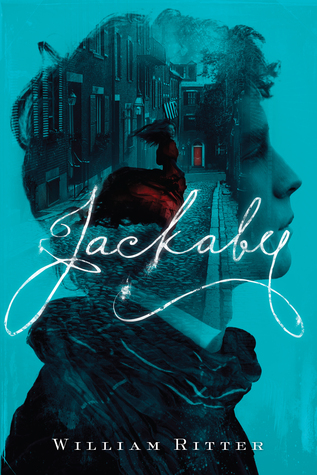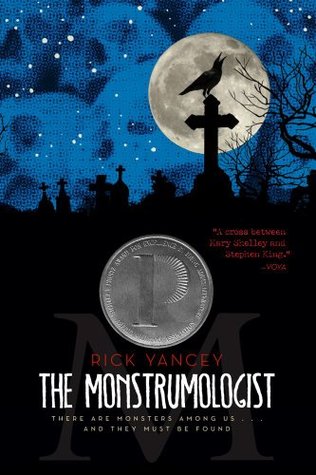Jackaby by William Ritter
My rating:
"Sherlock meets Doctor Who"? Hmm, sounds appealing, but that wasn't the reason why I decided to pick this book. "Cheeky humor and a dose of the macabre"? Yes, please.
Young Abigail Rook travels to New England with the purpose of having a job and to prove her parents that, even though she's a woman, she can sustain herself. When arrived in there, she meets the mysterious R.F. Jackaby, a scientist of the unexplained, and becomes his assintant.
"Scientist of the unexplained"... Now that I think about it, that sounds slightly familiar to something I have heard before. And its name has an "M" in it...

Yes, that's what it reminded me to: The Monstrumologist. Now, this was what called my attention. I mean, scientist of the unexplained? Innocent assistant who seems to be the only person who understands the monstrum—er, seer? Yes, please.
But there is where the comparison dies, gratefully and unfortunately...
Jackaby promised to be a great mystery/paranormal novel, and, you know, since it was supposed to have "a dose of the macabre," I was expecting all the perturbatively delicious amount of darkness, blood and violence that was present in The Monstrumologist. But it fell short on that. The truth is: Jackaby felt like the innocent, cleaned up version of The Monstrumologist. And by "cleaned up" I mean, washed out of the bloody material.
And now, I'll tell you about the characters...
Abigail Rook, as I said, is a young woman in look for a job. She's a likeable narrator, though I didn't particularly root for her. She can be very impressive sometimes: She seems to be intelligent, observant, and (here's the best part of her) strong. I liked her on the most. Something that didn't convince me a lot about her was the fact that she could swallow the fact that there are ghost and other supernatural creatures so easily; I mean, if you were told there is a pixie living on your head, would you just say "Oh, really?" and start wondering about how many species of fairies are there or would you be like "Umm, okay..."?
But Jackaby is the centre of my attentions. He has the intelligence and deductive abilities of Sherlock Holmes (Let's be silent for a minute. He's amazing. Holmes, I mean), and, based on what I've read about Doctor Who, since I haven't watched that series, the doctor's charisma. He sounds like an appealing character, doesn't he? Well, he is. Not that I loved him, but he was good enough for me to choose him as my favorite character in the novel. Too bad he seemed distant throughout the novel. A point in his favor? He knows chemistry! (But so does Warthrop, and Sherlock. Sorry Mr. Jackaby, but this seat is already taken)
The relationship between Jackaby and Miss Rook felt a bit unrealistic, though. I mean, she met the man, and in less than a day she trusted him completely. I don't know if it is because I don't trust people easily, or if it really is that Abigail trusted him too fast. Futhermore, in less than day she understood him as one would understand someone you nkow since your childhood, not an almost complete stranger. What do you think about that?
The writing in the book was neither great nor bad. What I mean is that it was simple, fast-paced and enjoyable. (Though I really wanted the darkness I was expecting). It was filled, at some points, with humor, which made the story more interesting. One complaint I did have for the writing is that it felt insipid. Abigail narrated the actions without filling it with emotion: It felt the same throughout the book. Imagine that you go to a restaurant, your food is brought, and when you taste it, you discover it has no condiments –no salt, no pepper, no anything. You wouldn't enjoy your food because it doesn't taste like anything. This is what I felt while reading this book. It fitted the time in which it was written, if that may add something good to it.
Another thing that I would have wanted to enjoy more was the storyline. Yes, that's perhaps the most important thing, but I didn't feel very thrilled and immersed in the story. It was predictable and it wasn't as exciting and addictive as I thought it would be. Part of it was the writing, again, because the writing was lacked of sentiment. And the job of Mr. Jackaby didn't sound as terrible as Abigail said it was. Her narration didn't make it sound dreadful. If anyhting, it just made it sound dull –and for me, it is a very intriguing job.
My favorite quote in the book? There you have it:
"Monsters are easy, Miss Rook. They're monsters. But a monster in a suit? That’s basically just a wicked man, and a wicked man is a more dangerous thing by far."
Sorry. I know you know what this reminds me to, but I can't get over that series. Nor I can stop this fangirling. My father says it's lack of social life. Or that I'm already crazy and I have no way back.

Anyway, this was, overall, a good read. Fast-paced, with likeable characters, a paranormal twist and some humour. Given the fact that I'm not usually craving for paranormal/fantasy books (I laugh everytime the words "ghost", "troll" or "fairy" is mentioned. I just can't believe in the existence of those things, not even in books), this was fairly good. I didn't find it ridiculous, and it was a fun read.
Snap to, readers! (Again, sorry. I needed to use that)
P.S.: I'm secretly jealous that this book, with less than a year of publication, is far more popular than The Monstrumologist, which at this moment has 6 years of circulating. I guess I shouldn't be worrying about that (the one who should be jealous is not even me), but I can't help it.
View all my reviews









